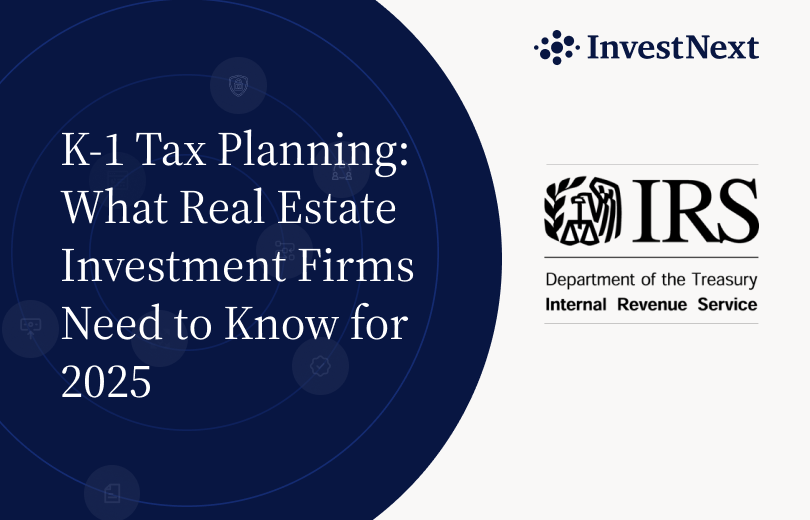In the dynamic landscape of real estate investment, the term “REIT” often surfaces, sparking curiosity and questions. What does REIT stand for? How does it fit into the broader context of real estate investment? This article will unravel the concept of REITs and illuminate their integral role within the real estate sector.
At the heart of this exploration is InvestNext, a trailblazer in real estate investment management.
Providing a comprehensive platform, InvestNext streamlines the entire lifecycle of real estate syndication. From the initial stages of raising capital to the intricate process of managing waterfall distributions, InvestNext is a trusted ally. Esteemed by top-tier real estate syndications and investment firms globally, it offers an institutional-grade experience to investors, fostering growth and success in their real estate endeavors.
As we delve deeper into the intricacies of REITs, their impact on real estate investment, and the pivotal role of platforms like InvestNext, you’ll gain valuable insights, whether you’re an experienced investor or a newcomer. So, let’s embark on this enlightening journey into the world of REITs.

Understanding REITs
At the core of the real estate investment sector is a key player known as the Real Estate Investment Trust, or REIT. A REIT is a company that owns, operates, or finances income-generating real estate, offering individuals an avenue to invest in large-scale, income-producing real estate. This unique model allows investors to partake in the income produced through real estate investment without directly purchasing, managing, or financing properties.
There are three primary types of REITs:
- Equity REITs: These REITs own and manage income-generating properties, with their revenue primarily derived from rents.
- Mortgage REITs: These REITs lend money to real estate owners and operators either directly through mortgages and loans or indirectly through the acquisition of mortgage-backed securities.
- Hybrid REITs: As the name suggests, these REITs combine the characteristics of equity and mortgage REITs, owning properties and holding mortgages.
Investing in REITs presents a unique set of benefits and risks:
Benefits:
- Accessibility: REITs offer a way for individual investors to profit from real estate investment without the need to own property directly.
- Liquidity: Unlike actual real estate properties, REITs are highly liquid.
- Dividends: By law, REITs are required to distribute at least 90% of their taxable income to shareholders annually in the form of dividends.
Risks:
- Market Risk: The value of properties may decrease due to various market factors.
- Interest Rate Risk: The cost of borrowing can increase, impacting the profitability of REITs.
- Reinvestment Risk: While REITs are required to pay out a high percentage of their income, this also means they have less cash on hand to invest in new properties or improve existing ones.

The Role of REITs in Real Estate Investment
REITs play a pivotal role in the real estate investment landscape, offering a unique blend of benefits that make them an attractive option for many investors. Here’s how REITs function in the real estate market and the impact they have on individual investors and the market as a whole:
- Democratizing Real Estate Investment: REITs have democratized access to real estate investment. Traditionally, investing in real estate required significant capital, making it inaccessible to many. However, REITs allow individuals to invest in real estate with the same ease as buying stocks or bonds, opening up opportunities for a broader range of investors.
- Diversification: REITs offer investors the opportunity to diversify their portfolios. Because real estate often reacts differently to market conditions than other types of investments, adding REITs to a portfolio can provide a level of protection against volatility in other markets.
- Income Generation: As mentioned earlier, REITs are required by law to distribute at least 90% of their taxable income to shareholders as dividends. This makes them a popular choice for income-focused investors.
- Economic Impact: On a larger scale, REITs also contribute to economic growth and job creation. They often lead to the development of new properties, the revitalization of older properties, and the generation of jobs in construction, property management, and other related sectors.
- Market Liquidity: By providing a way for investors to buy and sell shares in real estate assets, REITs add liquidity to the real estate market. This can help stabilize prices and reduce the risk of market bubbles.
InvestNext and REITs
InvestNext, with its comprehensive real estate investment management platform, serves as a powerful tool for managing REIT investments. Here’s how InvestNext can enhance your REIT investment experience:
- Streamlined Management: InvestNext’s platform is designed to manage the entire lifecycle of your real estate syndication. This includes everything from raising capital to managing complex waterfall distributions, making it an ideal tool for managing REIT investments.
- Automated Tasks: The platform offers automated transactional tasks like K-1 distributions with just one click. This automation can save investors significant time and effort, allowing them to focus more on strategic decision-making.
- Portfolio Management: InvestNext’s platform provides precise portfolio management tools. Instead of calculating returns on a spreadsheet, the platform does it for you, saving you hours of time. It also allows you to pay investors directly from your dashboard with its built-in ACH processing tool.
- Scalability: Whether you’re raising capital for the first time or managing a robust portfolio, InvestNext is built to help you scale. Its wide range of support and built-in features are all designed to ensure you remain in control of your deals.
- Trust and Security: Trusted by leading real estate syndications and investment firms worldwide, InvestNext provides an institution-grade experience to investors, ensuring your investments are managed with the utmost security and professionalism.

FAQs InvestNext – What Does REIT Stand For?
- What does REIT stand for?
- REIT stands for Real Estate Investment Trust. It’s a company that owns, operates, or finances income-generating real estate.
- What are the types of REITs?
- There are three primary types of REITs: Equity REITs, Mortgage REITs, and Hybrid REITs. Equity REITs own and manage income-generating properties, Mortgage REITs lend money to real estate owners and operators, and Hybrid REITs combine the characteristics of both.
- What are the benefits of investing in REITs?
- REITs democratize real estate investment, offer portfolio diversification, generate income through dividends, contribute to economic growth, and add liquidity to the real estate market.
- What are the risks associated with REITs?
- Risks include market risk, where property values may decrease, interest rate risk, where borrowing costs can increase, and reinvestment risk, where REITs may have less cash on hand for new investments.
- How can InvestNext help with REIT investments?
- InvestNext provides a comprehensive platform for managing the entire lifecycle of real estate syndication, including REIT investments. It offers features like automated tasks, precise portfolio management, scalability, and trusted security.
Revolutionize Your Property Investment Experience: Start Your Journey with InvestNext Today!
The world of REITs is both fascinating and complex, offering a unique investment avenue that bridges the gap between traditional real estate investment and the broader financial market. Through this exploration, we’ve uncovered what REIT stands for, the various types of REITs, their benefits and risks, and their significant role in democratizing real estate investment.
InvestNext, as a leading real estate investment management platform, stands as a testament to innovation and efficiency in managing REIT investments. With its streamlined management, automation, precision in portfolio management, scalability, and trust, it offers a comprehensive solution for both novice and seasoned REIT investors.
As the real estate market continues to evolve, REITs will likely remain a vital part of the investment landscape. Whether you’re considering investing in REITs or looking to optimize your existing REIT portfolio, platforms like InvestNext can provide the tools and support you need to succeed.







